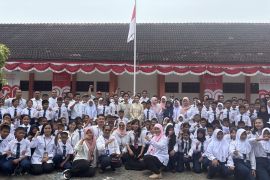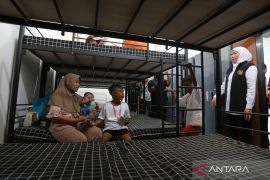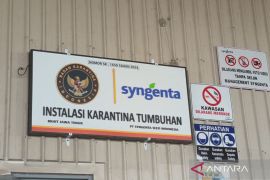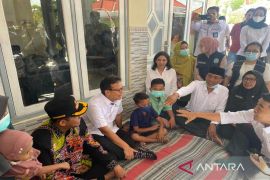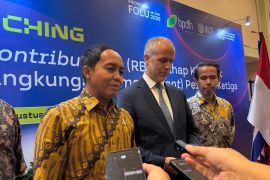HIV/AIDS cases are on the rise in many provinces in Indonesia, among others Bengkulu, Papua, Maluku, Aceh, and Banten, making the epidemic in Indonesia one of the fastest growing in Asia.
In Bengkulu, a non-governmental organization dealing with the lethal disease said on Monday that the province has 470 people with HIV/AIDS, and the number was increasing at a rate of 24.6 percent per year.
"To date we have recorded 470 people who are infected with the deadly disease of HIV/AIDS although according to the AIDS Management Commission (KPA) the figure is only 298," said Marly Yuanda, spokesman of Bengklu`s Kipas Foundation.
He said Kipas foundation had obtained its data through its outreach efforts among high-risk groups such as commercial sex workers, drug users, and transgenders.
The HIV/AIDS transmission rate in Begkulu was the highest in Indonesia because HIV/AIDS cases existed in all the province`s districts and cities.
"We can say that HIV/AIDS is endemic throughout Bengkulu because cases have been discovered in all districts and cities in the province and therefore the problem needs to be seriously tackled without delay," Marly said.
He said the addition of Volunteer Counseling Test (VCT) clinics at the Port Security Executive Unit (KP3) at Pulau Baai port was considered a positive way to prevent a HIV/AIDS epidemic.
But he added that such an effort was not sufficient to prevent the case because the VCT clinic had yet to be available at all district and cities.
In Banten province, Tangerang District AIDS/HIV Protection Commission (KPA) spokesperson Yully Soenar Dewanti has said 612 people have been tested positive for that lethal disease.
"Of 5,300 people with high risk, 612 have been tested HIV/AIDS positive," Yuli said in Tangerang recently.
Yully explained that based on a data from 1998 to 2010, 445 had been tested HIV positive and 167 had been tested AIDS positive and most of them were still young.
Based on the data collected by the KPA, Yully said the number of HIV/AIDS sufferers in Tangerang district rose every year.
"The number of HIV/AIDS sufferers will probably continue to increase because there are around 5,300 people with high risk of that lethal disease," Yully said.
The first case of HIV in Indonesia was reported in 1987 and as of 2009 a total of 3,492 people had died from the disease, and of 11,856 cases reported three years ago, 6,962 were people under 30 years of age.
Meanwhile in the westernmost Indonesian province of Aceh, it was reported that the number of HIV/AIDS sufferers in the provincial city of Banda Aceh increased from four to five in 2011.
"Only four sufferers were found in the first quarter but another sufferer was discovered recently in Peunayong," Banda Aceh deputy mayor Illiza Sa`aduddin Djamal said early this month.
In a seminar and advocacy management training and capacity building for HIV/AIDS concerned civilian elements organized by the Nahdlatul Ulama Islamic organization`s health institute, Illiza said the new sufferer was discovered during a test at a health service.
"It is possible the number of HIV/AIDS cases in Aceh will continue to rise as Aceh people are very open to outsiders while public awareness to medical checks is still low," she said.
To maximize public campaign on the danger of HIV/AIDS the city administration plans to hold a contest to select HIV/AIDS ambassadors in July.
She said the ambassadors would be assigned to inform the public about the danger of the disease.
According to the city`s head of the HIV/AIDS Control Team the number of HIV/AIDS cases in 2010 across the province was recorded at 79 and in the first quarter of this year the number rose by five more cases.
While in Maluku province, Aids Prevention and Control Commission spokesman Aziz Shamsuddin said in Ambon recently that the disease continued to spread over the years with the number of HIV/AIDS cases in the period of 1994-2010 was recorded at 1,335, consisting of 615 HIV cases and 720 AIDS cases.
He said the biggest number of people living with HIV/AIDS in Maluku in 2010 was found among the self-employed, prostitutes, and housewives.
"Of the 380 new HIV/AIDS cases that were recorded in 2010, 95 involved self-employed people, 94 prostitutes and 73 housewives," Aziz said in Ambon recently.
In terms of age, most of the HIV/AIDS sufferers or about 82 percent of the total were in the 15-39 years group, four percent in the 0-14 years group and 14 percent in the 40-60 years group, Aziz said.
HIV/AIDS in Maluku was for the first time detected in Tual in 1994 when it was believed to have been transmitted by a foreign ship`s crew.
Meanwhile, Coordinating Minister for People`s Welfare Agung Laksono pointed out that the number of HIV/AIDS cases in the Indonesia`s easternmost province of Papua was very high.
Cultural practices and levels of urbanization have an impact on the HIV/AIDS epidemic, and for instance, a culture of paid and transactional sex among young men and women aged 15 to 24 has been a driving factor in Papua.
Based on a data from AIDS Management Commission in Mimika district, Papua, there have been 2,463 HIV/AIDS cases in the district with the detail of 1,262 man and 1,195 women as of December 31, 2010.
Even Mimika AIDS Management Commission spokesman Erens Meokbun said HIV/AIDS cases in the district was the highest in Papua province with additional 407 cases of whom nine have died.
To slow down the spread of the disease, Indonesia`s local governments have investigated innovative techniques including using microchip tagging technology to keep track of the infected individuals known to be sexually active. (*)
Reporter: Otniel Tamindael
Editor: Aditia Maruli Radja
Copyright © ANTARA 2011


